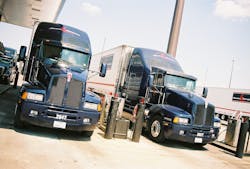The U.S. average retail pump price for both diesel and gasoline continued to fall this week, according to data tracked by the Energy Information Administration (EIA) though an imminent switch to “summer-grade” gasoline may push gasoline prices higher going forward.
Diesel dropped 3.6 cents this week to a U.S. average of $3.851 per gallon, the agency noted, which is 22.2 cents per gallon cheaper compared to the same week in 2012.
Retail pump prices for diesel also fell in every region of the country, EIA said, only remaining above the $4 per gallon mark in California ($4.047), with the Gulf Coast home to the cheapest diesel in the nation this week at $3.757 per gallon.
Gasoline prices dropped as well this week by 1.6 cents to a U.S. retail pump price average of $3.52 per gallon, which is 31 cents per gallon cheaper compared to the same week in 2012, the agency pointed out.
The price for gasoline only increased in one region of the U.S. this week, EIA noted – the Midwest – increasing there by only 8/10ths of a penny to $3.554 per gallon. Gasoline cost the most this week out on the West Coast ($3.80 per gallon), with the Lower Atlantic home to the lowest price ($3.41).
However, the agency stressed that fuel refineries are currently switching over to produce “summer-grade” gasoline; a blend with lower volatility than winter-grade gasoline to help limit evaporative emissions (measured by what’s called Reid Vapor Pressure or “RVP”) that normally increase with warm weather and cause unhealthy ground-level ozone.
It costs refiners several cents per gallon more to make summer-grade gasoline, compared with winter-grade fuel, EIA said, which is part of the reason that retail pump prices can rise in the summer.
Additionally, in parts of the country that require cleaner, reformulated gasoline (RFG), such “summer-grade” gasoline must meet even stricter limits on volatility, the agency added – with the Environmental Protection Agency (EPA), for instance, requiring use of RFG in high-smog areas to reduce smog-forming particulates and pollutants.
Several states and regions of the U.S. also sport their own gasoline “quality requirements,” noted EIA, with California, for example, having stricter requirements than the federal government.
The agency pointed out that the transition to low-RVP gasoline happens over the course of several spring months, with the federally mandated dates for summer-grade gasoline and reformulated gasoline, where required, being May 1 to September 15 for refiners and terminals, and June 1 to September 15 for gasoline retailers. In California switchover dates are earlier, and summer-grade gasoline must be in use for a longer period, EIA added.
About the Author
Sean Kilcarr
Editor in Chief
Sean Kilcarr is a former longtime FleetOwner senior editor who wrote for the publication from 2000 to 2018. He served as editor-in-chief from 2017 to 2018.
